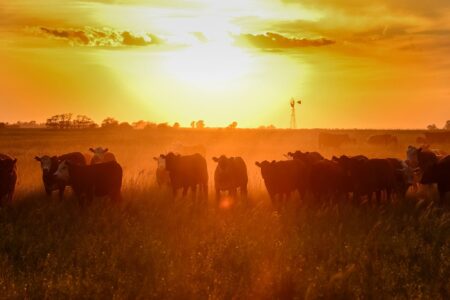Kristopher Klokkenga is the fourth generation to run his family’s 1,500-acre centennial farm near Emden, Illinois, midway between Peoria and Springfield. Eighty-five percent of his production is organic, including food-grade yellow and white corn, popcorn, alfalfa, and non-GMO soybeans, as well as conventional corn and soybeans.
His travels led him to Ghana. While farming he met and married his wife, Christina, from Denmark. The opportunity to take over his family farm led them back to the U.S., where they now raise their four children.
SF: How did you end up on a winding path that led from your family farm in Illinois to Ghana, Denmark, and back?
KK: I’ve always had the interest to travel abroad. In high school my parents really encouraged me to travel and expand my worldview. I had opportunities to travel to Australia and Europe in high school, and in college I worked in Brussels, Belgium.
After college I began working for ADM’s oilseed division. In spring 2007 I visited Ghana [in] west Africa with my father on a Christian mission trip. Shortly after, an opportunity to manage a crushing facility with ADM opened in Ghana. I was a general manager with ADM for two years, and while there I became increasingly interested in farming in Ghana.
A business partner and I formed Africa Atlantic Farms in late 2009, developing a small but modern commercial farm in Ghana on the shores of Lake Volta. I met my wife, Christina, while working in Ghana, and we were married in 2015. In 2016 we moved to Denmark to her family farm. In fall of 2018 we had the opportunity to move back to Illinois and farm.
SF: What drew you to farming in Ghana?
KK: Land was inexpensive, and the tropical climate allowed for two crops per year. I was interested in bringing modern farming techniques to Ghana. Prices for No. 2 yellow dent corn were consistently $9 to $11 per bushel.
The opportunity for mechanization is huge there. We’re not talking about the need to put Precision Planting on my planter; people are still putting three seeds and a fish in the ground in Africa and hoping it works. There are little things, like a finger pickup planter, that will take them to the next level, if they can implement them.
There was no road to my farm. There was no electricity. If we could get agriculture in Ghana now to where the United States was in the 1970s, we would be doing some great things.
SF: What led you to diversify your farm to include organic production?
KK: [In Ghana] I worked with two brothers from northwest Iowa who had an organic operation and were very successful. They encouraged me to consider organic as a means to capture more revenue off our existing land.
My dad was open to letting me start to transition some of our ground to organic in 2015. In 2019 we took over the farm from my parents. Organic has allowed us to diversify our farm and have a good quality of life to raise our family.
SF: What are the benefits to organic? What have been some challenges?
KK: As an organic farmer, I can typically sign contracts for grain in the fall of the previous year. I know what my bushels are going to be worth. That allows me to produce as many bushels as possible without being concerned about how I will market my grain. If I can meet those yield goals at those prices, I know I can do a good job of running my farm.
On the negative side I’ve had experiences where someone on the marketing side agrees to buy my product and after I have shipped, I haven’t gotten paid. It hasn’t happened a lot, but it has happened.
The other negative is navigating pest management. There’s not a lot of Organic Materials Review Institute approved insecticides and fungicides available. You have to know your level of risk. Crop rotation has been one of the biggest keys in organic farming.
Background: Kris Klokkenga is the fourth generation to farm on his family’s centennial farm near Emden, Illinois. He has an agricultural economics degree from the University of Illinois and a Master of Divinity from Lincoln Christian Seminary. Kris and his wife, Christina, raise organic crops and their four children.


:max_bytes(150000):strip_icc()/46495119094_d2bc74feb9_o-2000-5b4c22e8d6b94a8cbafaea4e3819967d.jpg)
:max_bytes(150000):strip_icc()/wade-boeshans-executive-vice-president-of-summit-carbon-solutions-testifies-april-22-2024-in-mandan-north-dakota-during-a-public-service-commission-hearing-photo-by-kyle-martin-for-the-north-dakota-monitor--ff7282b7c3e747d082717cc6eafeaa49.jpg)
:max_bytes(150000):strip_icc()/7020555farm_field-1342991889_Thomas_Barwick_preview-5cbe28e833e04c298f11ce1a25869c14.jpg)


:max_bytes(150000):strip_icc()/7020543Nov202415minKlokkengaportraitfinal-7a6889289bc545b581bd996c52e75921.jpg)
:max_bytes(150000):strip_icc()/vintage20red20barn20and20farm-bb9ce25774f741e4991f184fa42bdc92.jpg)

:max_bytes(150000):strip_icc()/7020558ProblemArt-MidNov24-371f0040af164f0aaa81d88c20958e94.jpg)